NI election results 2022: Governments urge parties to re-establish executive
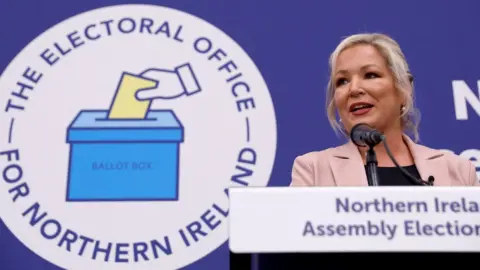 JASON CAIRNDUFF/Reuters
JASON CAIRNDUFF/ReutersThe US, UK and Irish governments have urged political parties in Northern Ireland to re-establish a devolved administration.
Sinn Féin secured the most seats in the assembly election, a first for a nationalist party in Northern Ireland.
Sinn Féin's Michelle O'Neill is in line to become first minister, if the DUP nominate a deputy first minister.
However, Northern Ireland Secretary Brandon Lewis has played down the prospect of a border poll being called.
The Northern Ireland secretary said the election results were "significant", but pointed out that unionists still have more seats than nationalists at the Northern Ireland Assembly.
"So I think the focus at the moment quite rightly is on getting Stormont back up and running," he told BBC NI's Sunday Politics programme.
Ms O'Neill, who leads the party in Northern Ireland, said on Saturday that the party will be at Stormont on Monday, ready to form an executive.
She said "other parties" need to be ready to form an executive and that there should be "no excuses" or "time wasting".
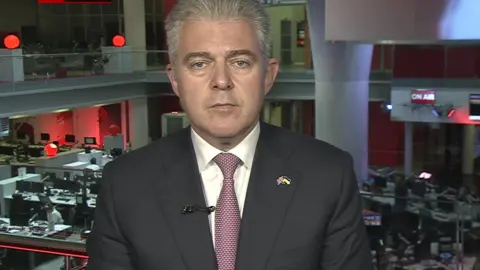
Under the terms of the Good Friday Agreement, the decision on when to call a border poll rests with the Northern Ireland secretary.
Sinn Féin's ultimate goal is for Northern Ireland to leave the UK and become one country with the Republic of Ireland, but that does not mean a border poll is imminent.
When asked what the criteria is for calling such a poll, Mr Lewis did not answer the question directly, but referred to the results of the assembly election.
He said he intends to meet Stormont party leaders on Monday to try to ensure the power-sharing executive resumes.

All eyes on Stormont
Analysis by Mark Simpson, BBC News correspondent
Politicians in Belfast have big decisions to make and the world is watching.
When governments in London, Dublin and Washington start making statements about Northern Ireland, it is always a sign that a critical moment has been reached.
There is no immediate sign of a power-sharing executive being restored at Stormont following the election.
Behind the scenes, the talking began even before the votes were all counted.
Attention is focused on the DUP leader Sir Jeffrey Donaldson to see whether anything can be done to persuade him to return his party to the executive.
Sinn Féin are waiting.
Michelle O'Neill is ready to become the first republican to hold the top post at Stormont in the 101-year history of Northern Ireland.
Unless something dramatic happens in the next week, it could be a long wait.

Northern Ireland has been without a power-sharing executive for several months after the DUP collapsed the institutions as part of its protest against the Northern Ireland Protocol - part of the Brexit deal.
He previously said he would be meeting party leaders over the coming days and would urge them to restore the Stormont institutions, starting with the nomination of an assembly speaker within eight days.
While the office of the first and deputy first minister is an equal one with joint power, the allocation of the titles is regarded as symbolically important.
Although Sinn Féin can now nominate a first minister, they cannot take up the office unless the Democratic Unionist Party (DUP) - the biggest party from the unionist bloc - agrees to nominate a deputy first minister.
Its leader Sir Jeffrey Donaldson has not yet made a decision on whether the party will do that.
On Saturday, Sir Jeffrey said his party would respect the result of the election, however there needed to be changes made to the protocol.
On Sunday, DUP MLA Jonathan Buckley told the BBC the party had "stood on a manifesto which was the removal of the Northern Ireland Protocol".
"Either the secretary of state wants an executive, or a protocol - he can't have both," he said.
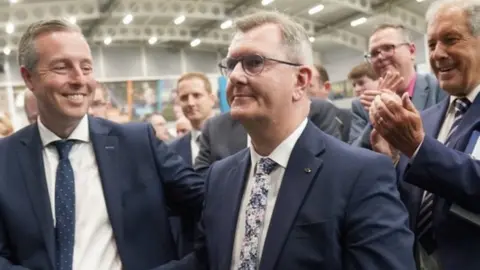 PA Media
PA MediaThe US State Department called on the parties "to take the necessary steps to re-establish a power-sharing executive".
"Critical and immediate challenges concerning the economy, health, and education are best addressed through the collective efforts of a devolved government chosen by, and accountable to, its people," spokesperson Ned Price said.
Taoiseach (Irish prime minister) Micheál Martin said it was "incumbent" on all elected representatives to deliver on their mandate through the nomination of a first and deputy first minister.
"A new power-sharing executive is vital for progress and prosperity for all in Northern Ireland," he added.
A unionist party had always been the largest in the assembly, and previously the Stormont Parliament, since the formation of Northern Ireland in 1921.
For Sinn Féin to be installed in the role of first minister, the majority of unionist assembly members have to agree to form a power-sharing coalition.
The party's director of elections, John Finucane MP, told the BBC's Sunday Politics programme: "We want to sit down and work with every party... to sit down and figure out how we get the executive back up and running."
In her acceptance speech on Saturday, Michelle O'Neill said the "executive needs to be formed immediately" and that people "struggling with the cost of living are relying on us to get on with things and do our jobs".
The executive is at the heart of Northern Ireland's devolved government, made up of ministers nominated to oversee key departments such as health, finance and justice.
Alliance surge
For the first time, the Alliance Party has become the third-biggest in the Northern Ireland Assembly.
The centre-ground party won 17 seats - up from the eight it won in 2017 - and 13.5% of first preference votes.
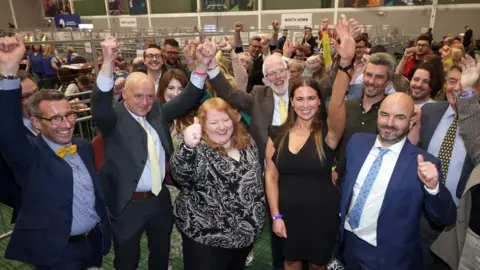 Pacemaker
PacemakerThe party took a number of seats in the assembly election at the expense of the DUP and Social Democratic and Labour Party (SDLP).
SDLP leader Colum Eastwood has said he believes that in some areas his party's supporters also "lent their votes to Sinn Féin".
"I think there's a tide there and people wanted to send a message, they wanted to kick the DUP and I think this is how they decided to do it," he told BBC News NI.
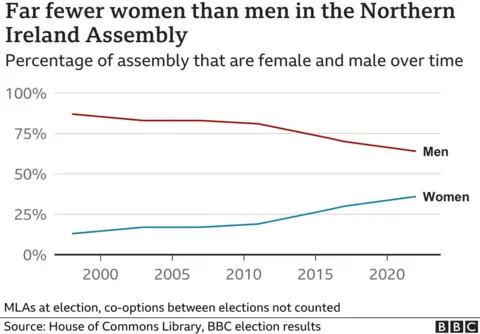
More than a third of the MLAs elected to the assembly are women.
Thirty-two of the 90 MLAs are female, compared with 27 who were elected in 2017.
